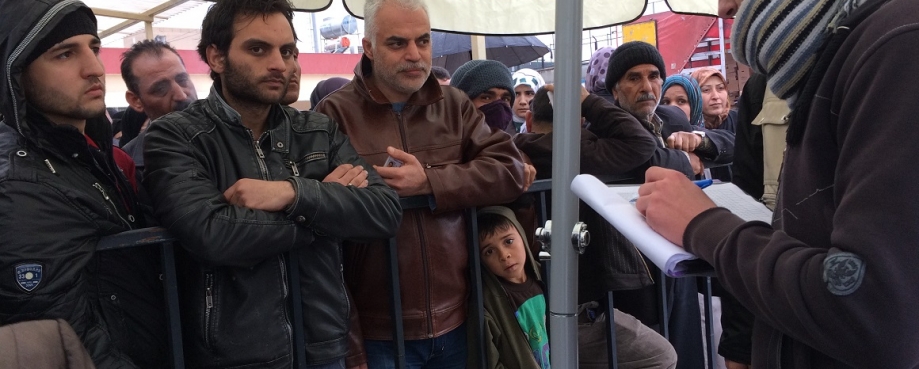
In Turkey, debates continue over Syrian refugees’ participation in the labour market, writes Dr Emre Eren Korkmaz, before outlining what he believes is the best approach to building a fair and functional garment sector where both Syrian and Turkish workers can find decent employment.
Turkey’s debate over Syrians and work is nothing new. It’s been vigorously discussed from different perspectives since 2011 when refugees first started moving into Turkey in large numbers.
Yet, we’re now talking about three million people, almost half of them of working age, and we’re seeing a growing problem around child labour. This is not something that is going to go away anytime soon.
The good news is that there is increasing interest in finding solutions. We’re seeing new projects, initiatives and programmes, including the current ETI Turkey Programme.
Another positive development is that all institutions and organisations working with refugees want to cooperate – to take further steps to change the difficult conditions in which many refugees find themselves.
However, technical and practical cooperation is not enough. What is needed is a common, truly collaborative approach.
Defensiveness does not solve problems…
In this blog, I would like to discuss one aspect of existing attitudes, which if not addressed, may well stall progress.
It’s what I call a “defensive” approach, with stakeholders essentially raising barricades and being tempted to only pay attention to the workplaces from which they source, or are responsible for; concentrating on keeping those safe – and “clean” in the widest sense of the word – within international standards.
Such an attitude might have been acceptable pre-January 2016, when it was illegal to employ Syrian refugees. Consequently, it was not officially possible for an authorized supplier to employ a Syrian refugee or for any union to recruit Syrian members.
Yet now, Syrian refugees can be formally employed in all tiers of the supply chain and temporary work permits received via the application of an employer to the e-state portal.
…meanwhile in the real world refugees are desperate…
The complexity of real life supply chains means that no stakeholder can free themselves from the general problems of the sector.
Long-term permanent work is a necessity; it is clear that Syrian refugees cannot rely on philanthropy or charitable donations as this is not sustainable.
But as of September 2016, research shows that that only 5,500 temporary work permits have been granted. So why isn't there much interest in employing Syrian refugees via legal means?
The “defensive” approach coalesces around a couple of broad theories:
- Some argue that Syrian refugees are only in the country temporarily. That refugees are planning to leave Turkey for Europe and don't want to be legally employed for fear of losing legal ways to move to Europe. (“If you have a formal job, why are you changing country?”). While this might be true for some refugees, studies show that the majority prefer to reside in Turkey due to ethnic, religious and cultural ties.
- Other arguments focus on the business logic. Most Syrian refugees are unskilled workers so the argument goes; they are not familiar with the industry and industrial concepts, they don't know the Turkish language; employing Syrian refugees would necessitate the employment of Arabic speaking staff and the provision of extra training, leading to an additional financial burden. Despite having some validity, these too are only partial truths.
Three million refugees have not suddenly descended on the Turkish labour market en masse desperately searching for work.
We are talking about hundreds of thousands of refugees who are already being employed in the Turkish textile sector, but under informal and often exploitative conditions of employment.
Even if they are being exploited, refugees have already gained requisite employment skills and knowledge of the garment sector. And let’s not forget that there are many sections in textile plants that employ unskilled workers anyway.
The reality is that refugee workers are desperate for jobs at any cost and even if “defensive” arguments are delivered from real experiences, they are not leading to concrete solutions.
… so a new approach is necessary
A large informal sector, child labour, long working hours and problems over freedom of association are endemic within Turkey’s garment industry.
And have been for decades.
In the meantime, the influx of Syrian refugees has made these problems much worse and much more complex.
Another approach is therefore desperately needed, and one that will not only benefit Syrian refugees but also Turkish workers, leading to decent, formal jobs for all.
It’s an approach that should allow brands and suppliers to employ Syrian refugees with the necessary skills and for unions to recruit Syrian members to represent their interests.
Pro-active, forward-looking close collaboration must be the way forward around which all stakeholders can unite:
- If there are bureaucratic problems over re-registration of residence for refugees or around receiving work permits, we may look to work with government agencies.
- If there are skills and language gaps, we can collaborate with business associations, unions and government agencies to intensify training and language programmes. Such programmes work well in Germany and there are many vocational schools and training centres in Turkey.
- If the labour networks currently facilitating jobs for refugees’ act as blocks to Syrians working under formal conditions, we should focus on opening new channels to legal employment.
- If Syrian refugees cannot represent themselves in the workplace, let’s work with unions and add new aspects to current social dialogue programmes to form the necessary mechanisms that allow Syrian refugee workers to represent themselves.
- While this is clearly not an easy task, it is possible.
But the emphasis must be on the long-term and on addressing the links between the endemic general problems that beset the industry and the refugee crisis.
That’s why ETI’s Turkey programme aims to collaborate with all institutions and organisations and determine basic, concrete tasks together with all stakeholders to achieve progress in promoting decent work for all workers.
